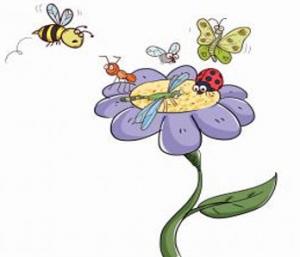
Thanks to the real-life bat, the reel-life Batman became a superhero. I have vivid childhood memories of the trees near my school from which more bats hung than leaves. During summery dusks, they’d glide away en masse in a procession. I believe, even then as today, people would’ve been susceptible to the viruses spread by their droppings. But such cases were unheard of. Rather, people fed upon this fascinating creature to cure their ailments— like, rheumatism, asthma, and chest pain; and used bat hair to treat shivering during fever.

Whenever that sweet tinkling sound traverses through my balcony, my entire mood rejuvenates. I crane my neck, investigating its source, and scan my lushy green enclave for a soft jingling song. Tracing the tsee…tseer… notes, I rejoice with delight on spotting the chirpy, cute, bundle of joy—the Indian White-Eye.

A buzzing catalogue of some important bee-types—the rock bee, little bee, Indian hive bee, European bee, and dammer bee. *************************************** So far, we have only touched upon a few of the many things about the life of bees and what an important part they play in saving our planet. Honey is not just something sweet and tasty; but what makes it sweeter is the makers of honey—the bees. There are over 2,000 bee species across the world and not all of them make honey. In India, there are five major bee types that produce honey...

A fascinating narrative by Grandpa Marigan to a curious child, discovering the sacred traditions of the Kattunayakan tribe and how it honours the bees, the bears, and trees for honey. This is the rallying call of the village elder when he invites his companions to join him in going to the forest to collect honey among other things. Marigan, the wise old Kattunayakan elder from Chembakolli village in the Gudalur Valley of the Nilgiris, has been collecting wild honey from the time he was a child.

We are passing through another wave of extinction of species, and even the tiniest insects are threatened. Join Sorit on an exploration of this apocalypse that has put a deep dark shadow over this seemingly teeming world.

For young and curious minds, one of nature’s enduring mysteries is how an eternally busylooking, buzzing insect – the honey bee – manages to create a food (honey) that is so sublime. And added to that is the question that always comes up: is the honey that I am eating ‘really good for my health’ and ‘pure and natural’? We invite children, teachers and parents to a special Young Environmentalist MasterClass on the subject of honey and honey bees, with two well-known experts – Stan Thekaekara of Just Change India and Amit Khurana of Centre for Science and Environment.

Bees are indispensable pollinators and exist in all types of climate—from forests in Europe, deserts in Africa to the Arctic Circle. But what would happen if all of them just disappeared one day? Here's a look. ******************************************* What if one day you step into your house and find there is no food. The refrigerator is empty and you switch on the television to know more. A news channel tells you that there is a food crisis and the reason for this is that there are no bees left in the world...

The 'buzzy' bees are best at their pollination jobs but they are all set to face serious competition from other insects. According to a new study, insects like flies, wasps, butterflies, moths, ants, thrips and beetles are also effective pollinators of certain crops of global importance. These insects have an added advantage too—they are resistant and less sensitive to environmental changes, scientists say.

